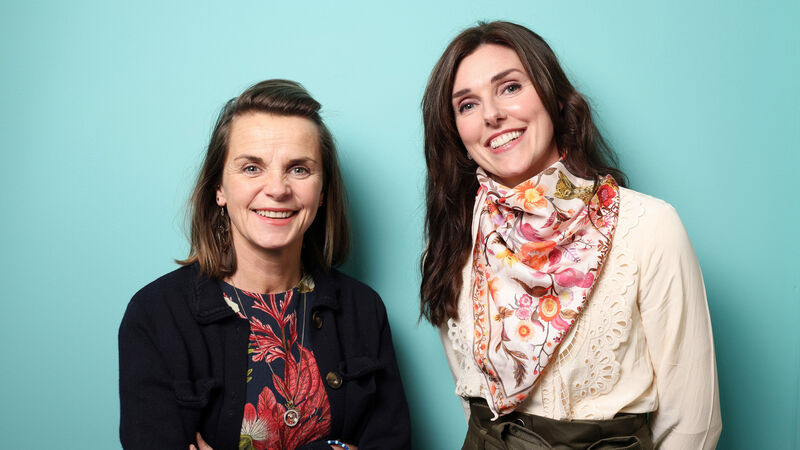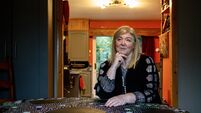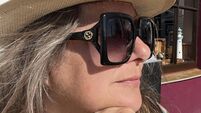Meet the Cork women hoping to rid health service of 500 tonnes of waste each year

Lisa O’Riordan and Dr Mary O’Riordan, Co-Founders of HaPPE Earth, attending the Bord na Móna Accelerate Green, Ireland’s leading sustainability programme. Picture: Marc O'Sullivan
“I HATE wearing all that plastic. I know we have to but I am so worried that we are making everything worse for the next generation.”
So says Rosarie, a nurse on the current HIHI-HSE pilot study running in the South Infirmary Victoria University Hospital (SIVUH) in Cork - where they are trialling a new compostable apron from Irish start-up company HaPPE Earth.
The female entrepreneurs who developed the HaPPE Apron are hoping to ultimately convince the healthcare industry to make a shift from single-use plastic consumables to medically approved compostable alternatives and green solution products and, in so doing, reach their sustainability goals.
Dr Mary O’Riordan, Clinical Advisor and Co-Founder of HaPPE Earth, has more than 18 years’ experience in a hospital setting specialising in the area of highly infectious and emerging diseases, and the nation’s preparedness and responses to them.
“I trained in public health medicine, so I was always looking at diseases with a broader societal vision,” she explains.
“Due to the need for strict infection control, in recent years there has been a significant move in hospitals towards single-use plastics.”
Along with co-founder Lisa O’Riordan, Mary was eager to explore ways in which to reduce the healthcare industry’s over-reliance on single-use plastics.
“Plastic waste is generated at a rate of 400 mega tonnes per year, of which the global healthcare sector is a major contributor.”
According to healthcare’s climate footprint, “If it were a country, the global healthcare sector would be the fifth largest greenhouse gas emitter on the planet”.
“A tonne of compostable PPE (personal protective equipment) products is a tonne of added value,” says HaPPE Earth’s website.
“However, a tonne of plastic aprons is a tonne of problems.
“We believed that if we could help rid the Irish health service of single-use plastic aprons, it would mean a reduction in plastic waste by 500 tonnes each year,” outlines Mary.

However, after much deliberation and debate on what they could possibly do to guide the healthcare industry towards medically approved compostable alternatives, it was in fact Mary’s brother David, an instrument and mechanical engineer, who came up with a potential solution.
He had been jogging outdoors one day when he spotted microbiome sheeting covering a field of crops. David suggested that if this sheeting could work on the land, at the mercy of the elements, there might be a way to design and manufacture a PPE apron out of similar, tried and tested material that was not only functional and efficient, but which would provide a guilt-free protection without being harmful to the environment.
In broader terms, they hoped it would help to protect the planet for subsequent generations.
With a goal in mind, the trio approached an experienced Irish agricultural manufacturer to discuss the design of their idea. And that was the moment of conception for HaPPE Earth.
Their long-term intention is to champion sustainability and the circular economy by aiming to bring together medical grade compostables with a compostable medical waste solution to a growing problem.
Their flagship product is a PPE apron made from a bio-resin, composed of an innovative family of compostable bioplastics that have been developed over the past 25 years.
Derived from a sustainable maize source, the HaPPE apron matches all the safety parameters of current LDPE (Low-Density Polyethylene) single use aprons, is suitable for use in healthcare, is CE approved and, most significantly, disappears in a single composting cycle of eight weeks. Eight weeks versus 50+ years in a landfill for plastic! What’s not to love?
Moreover, the HaPPE apron’s carbon footprint is 64-75% lower than a standard PPE apron, produces zero residual waste and toxic residue, incurs zero single-use plastic tax, with a secure supply chain pathway and local manufacturing.
Because it is compostable, it also places less burden on the non-clinical waste services of hospitals.
This organic birth of HaPPE Earth has already resulted in the company being awarded Winner of Health Innovation Hub Ireland’s open call in 2022.
The name too embodies the quintessence of social entrepreneurship in its innate melding of two industries, Healthcare and Agriculture, to, in turn, help the planet.
Mary refers to the late American singer and activist, Pete Seeger who once said, “If it can’t be reduced, reused, repaired, rebuilt, refurbished, resold, recycled, or composted, then it should be restricted, redesigned or removed from production.
“While we appreciate that spending in a hospital is dependent on, firstly, care for staff and patients, it is ultimately determined by budgetary restrictions. The intrinsic added value, on both a local and a global level, of our HaPPE Apron comes at a higher initial cost,” explains Mary.
“However, we are hoping to convince the healthcare industry that the value of their investment in a locally-produced, medical-grade functional, compostable product is where their emphasis must lie.”
They have also developed a system that assists the healthcare industry to not only measure and reach their Sustainability Development Goals (SDG), but to become a leader in the reduction of single-use plastics consumption.
Mary is coming to the end of The New Frontiers programme at the Rubicon Centre, MTU.
“The course has been excellent. I don’t have a business background and appreciate that, to get any project off the ground, you have to have a business plan, understand finances, sales, be able to read a profit and loss sheet, know how to present to investors, etc. I have literally had to learn it all.
“The programme focuses your experience, and I have benefitted so much from the real-world professionals who have shared their expertise and knowledge with us, and related them to identifiable things.”
With a second prototype product already in development, and another pilot study about to be launched in Tallaght General Hospital, it is all systems go for the HaPPE team of Dr Mary O’Riordan, Lisa O’Riordan, David O’Riodan and Pearse Ryan.
HaPPE Earth are only getting started. See www.happeearth.ie
******
Over the coming weeks, Linda Kenny will also interview the other women taking part in the New Frontiers programme in the Rubicon at MTU:
Angela Nagle of BladeBridge
Claire Keane of Second Street Bakeshop
Clodagh Ryan of CRAOI
Kate and Rebecca Popova of Everywhere English
Mary O’Riordan of HaPPE Earth
You can also catch up on our interview with participant Dr Justina Ugwah, Clisteprobe here, who featured in Wow! last week.
For more on the work of the Rubicon Centre, see www.rubiconcentre.ie







 App?
App?


